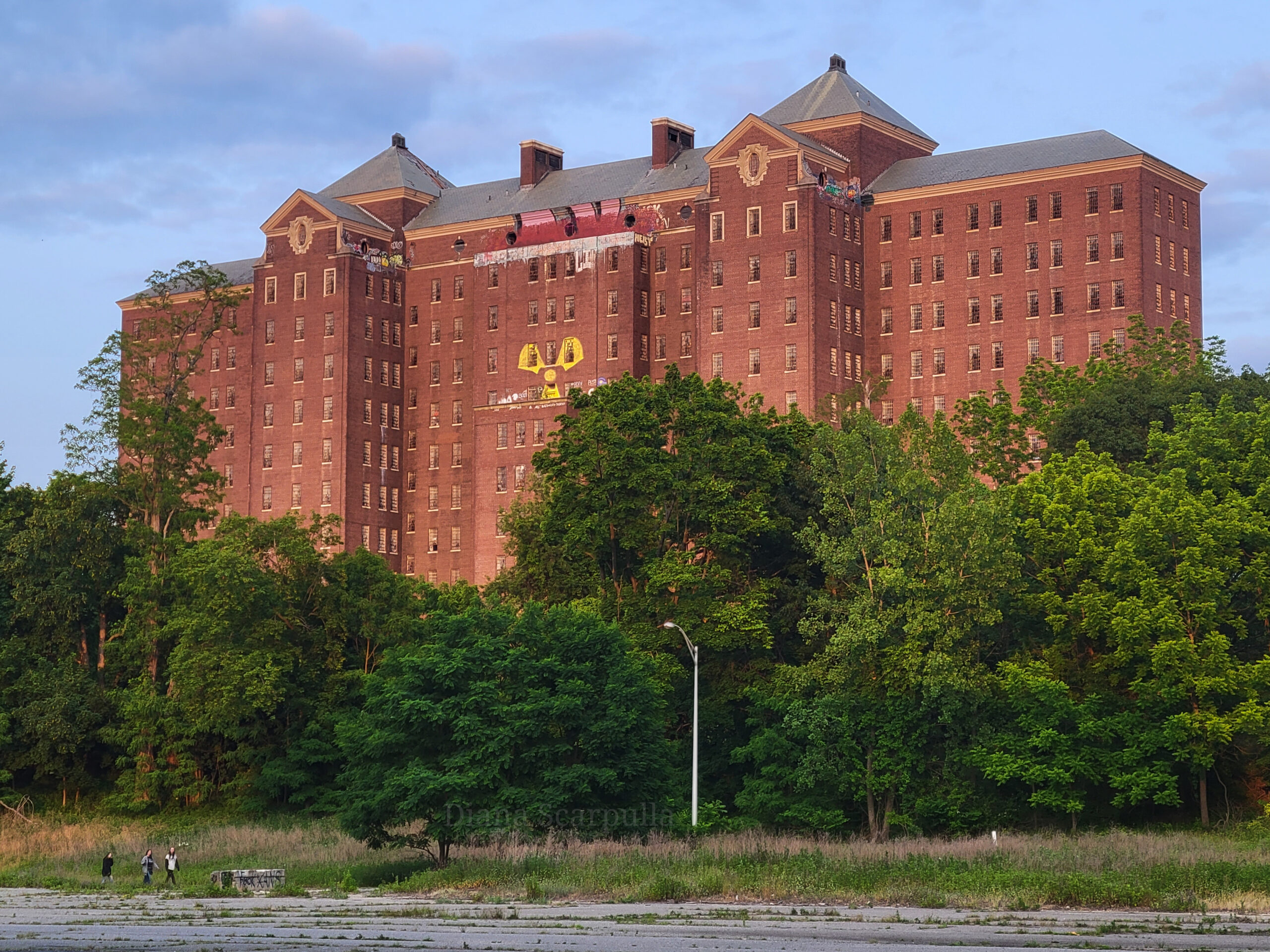
Building 93 present day. Photo Credit: Diana Scarpulla
Why is the King’s Park Psychiatric Center historically significant?
The Kings Park Psychiatric Center was opened in 1885 in Kings Park, N.Y. for mental health care treatment as one of New York’s former state hospitals. The oldest extant buildings date from 1890, the campus itself having once held over 100 structures throughout its 111 years of operation. The facility formally closed in November 1996. Four years later, in 2000, the Nissequogue River State Park opened on the former hospital campus. Today it encompasses over 500 acres and offers park visitors a variety of amenities including walking and hiking trails, bird watching and fishing, access to canoe and kayak launch, and fields for sports and other recreational activities. The site is also designated as a Bird Conservation Area. Two of the remaining hospital buildings are currently in use and one, York Hall, the hospital’s amusement hall, is in the process of restoration. Due to a lack of security, the remainder of the hospital buildings suffer from ongoing theft, arson, and other acts of vandalism. In addition, owing to a dearth in maintenance, these structures have become littered with the presence of mold and asbestos, and continue to worsen under the natural elements and tides of time. Given the unpredictability of human behavior and the elements, it is difficult to estimate the rate of deterioration.
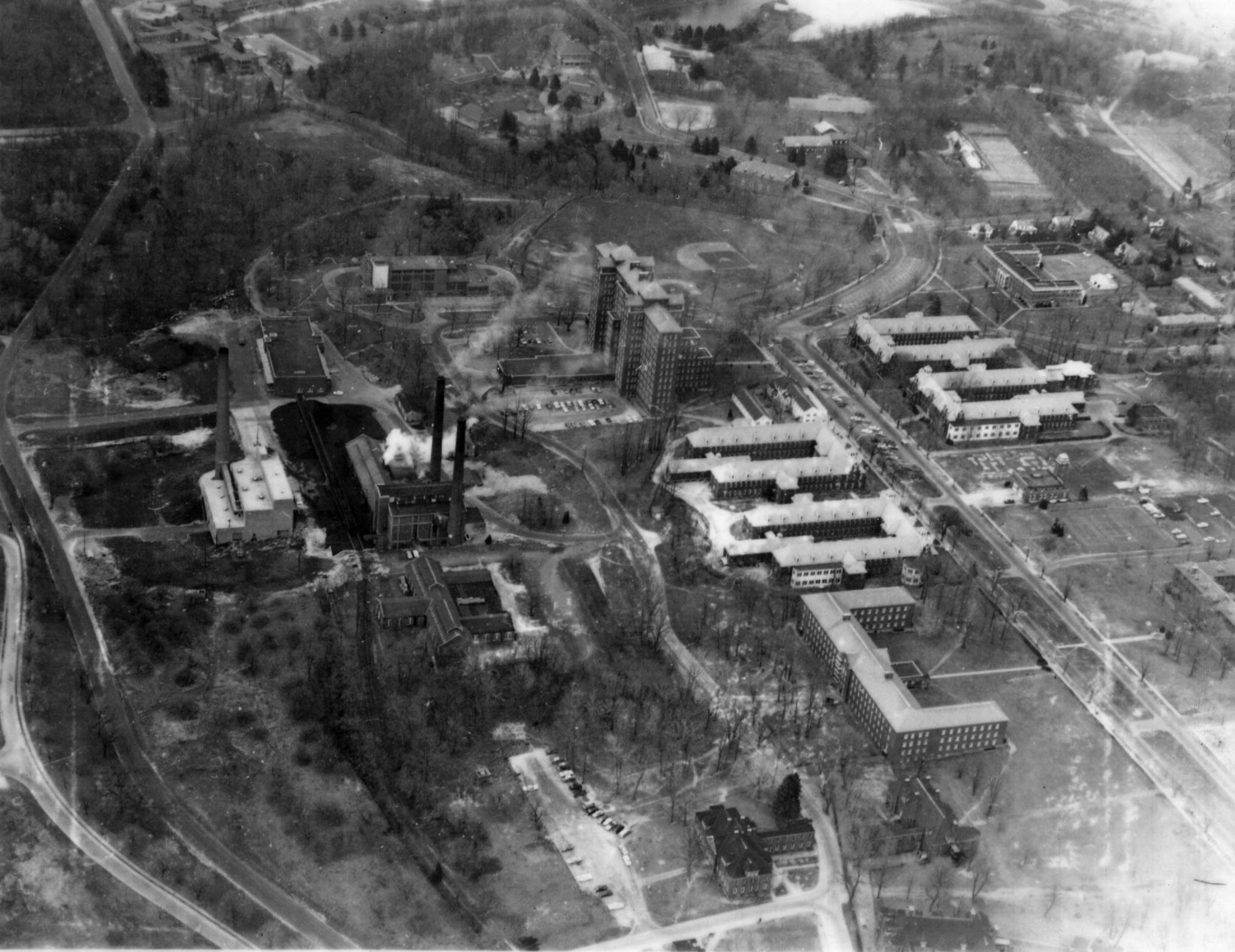
Why is Kings Park Psychiatric Center endangered?
The threat surrounding the remaining structures of the former Kings Park Psychiatric Center is, and has been, urgent. The lack of security and maintenance has contributed profoundly to the decline of the property. Equally as threatening is the recent revision of the property’s eligibility for the National Register of Historic Places (NRHP). In 2007, a Resource Evaluation Survey determined that the hospital was eligible for a large-district listing. This determination would have encompassed the entirety of the present-day Nissequogue River State Park. However, following a more recent survey conducted as part of the development of a Master Plan for the Nissequogue River State Park, the property was deemed no longer eligible for a large-district listing. This was largely due to the removal of a number of hospital buildings over the last decade or so, thereby disrupting the cohesive narrative representing the hospital’s history. In other words, the Kings Park Psychiatric Center’s eligibility for the NRHP has been measured according to its built environment. Only 16 buildings retained their prospective NRHP status. This includes York Hall and Building 93, both as individual nominations and the 14 buildings composing the former Veterans Memorial Hospital Unit as a small-district nomination.
The revocation of the large-district eligibility has left the sites historical and cultural resources vulnerable. Under this new designation, there is no legal obligation to mitigate any alterations or demolition of the remaining hospital structures. The landscape of the park itself, too, can undergo similar renovations and removals with no legal compensation mandated for losses. The removal of the large district boundary has left the sites historical and cultural resources vulnerable. Equally endangered is the environmental well-being of the site owning to prospective alterations outlined in the Master Plan.
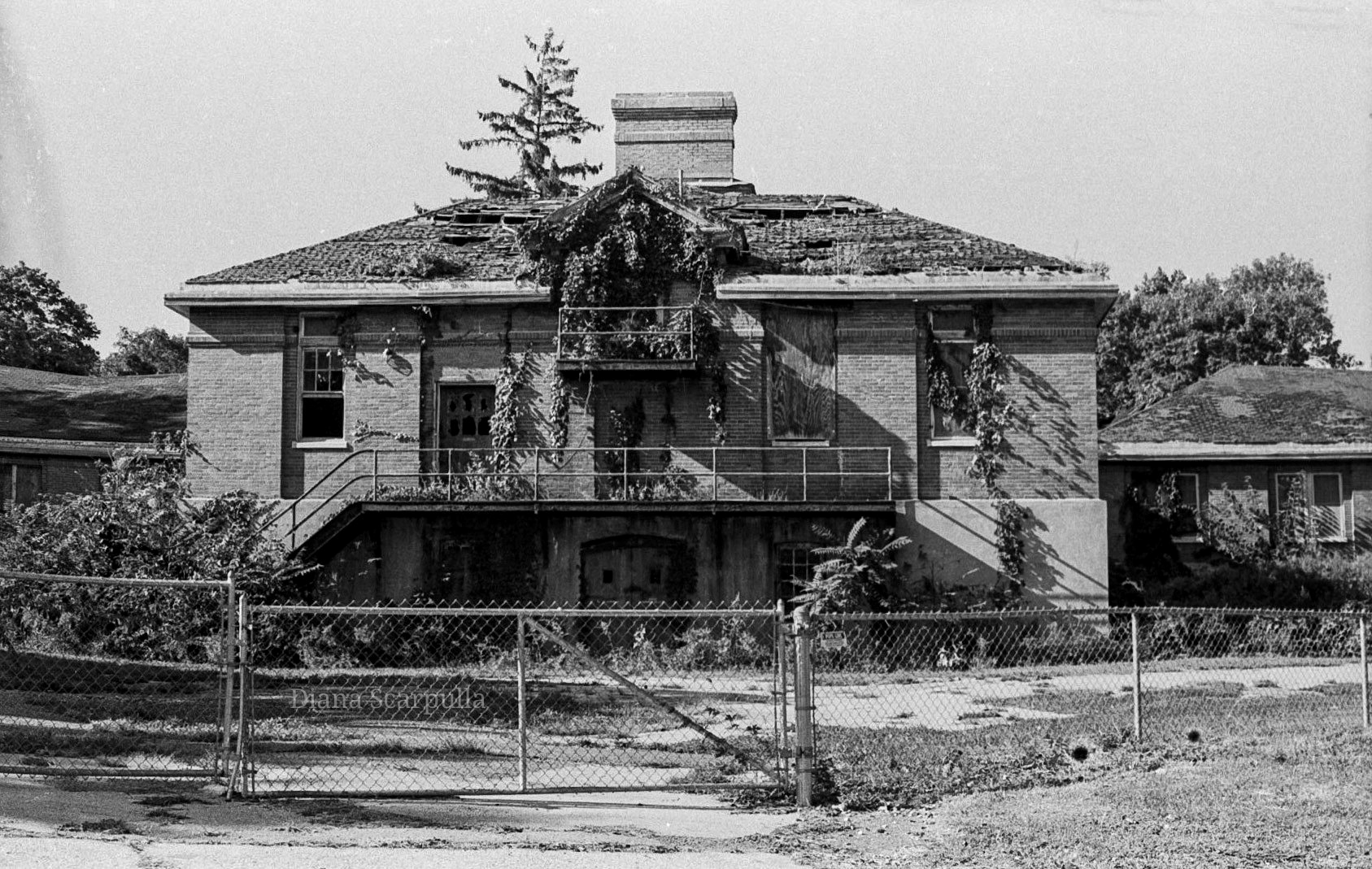
How can Kings Park Psychiatric Center be preserved?
The history of the former Kings Park Psychiatric Center remains a fundamental component in public interest in the Nissequogue River State Park. Failure to interpret, mitigate, and preserve the history of the site not only proves counter to the interests of the community, but would neglect an integral part of the history of the Kings Park community, and Long Island region broadly. Moreover, the absence of preservation concurrently obscures the lived experience and memory of the individuals who had contact with the state hospital, compounding their marginalization as persons living with a mental health challenge. The restoration of the hospital’s eligibility as a large-district nomination to the National Register of Historic Places remains a prominent strategy in ensuring the preservation of the former Kings Park Psychiatric Center. Assessing the site within the context of a cultural landscape, as opposed to solely relying on its architectural significance as a determinant, will grant its historical and cultural resources proper consideration and protections. While such a designation will not entirely prevent the removal of remaining hospital buildings or alterations to the park’s landscape, it will legally obligate mitigation to be undertaken should changes to the site occur. This assurance will generate productive opportunities for interpretation of the hospital’s history within the park – such as the installation of historical markers and signage, development of living ruins, and projects incorporating the footprints of now demolished buildings – all of which will ensure the preservation of the hospital’s history while contributing to the overall well-being and amenities of the Nissequogue River State Park.
Integral to the retention and preservation of the Kings Park Psychiatric Center is the retention of the Kings Park Boulevard. A historical roadway constructed during its inaugural years, the hospital grew along and around the Boulevard, which bisected the entirety of the facility and remains intact in the present-day park. The Boulevard served both the Kings Park Psychiatric Center during its years of operations, and the surrounding community of Kings Park, which it continues to up to the present day. The current terms of the Master Plan for NRSP/KPPC contains a proposal to remove the Boulevard. The loss of this major roadway would not only distort the historical context of the former hospital but alter the infrastructure of the town of Kings Park. This proposed alteration has generated much concern among community members, many of whom were unaware of the proposal and are opposed to the Boulevards removal.
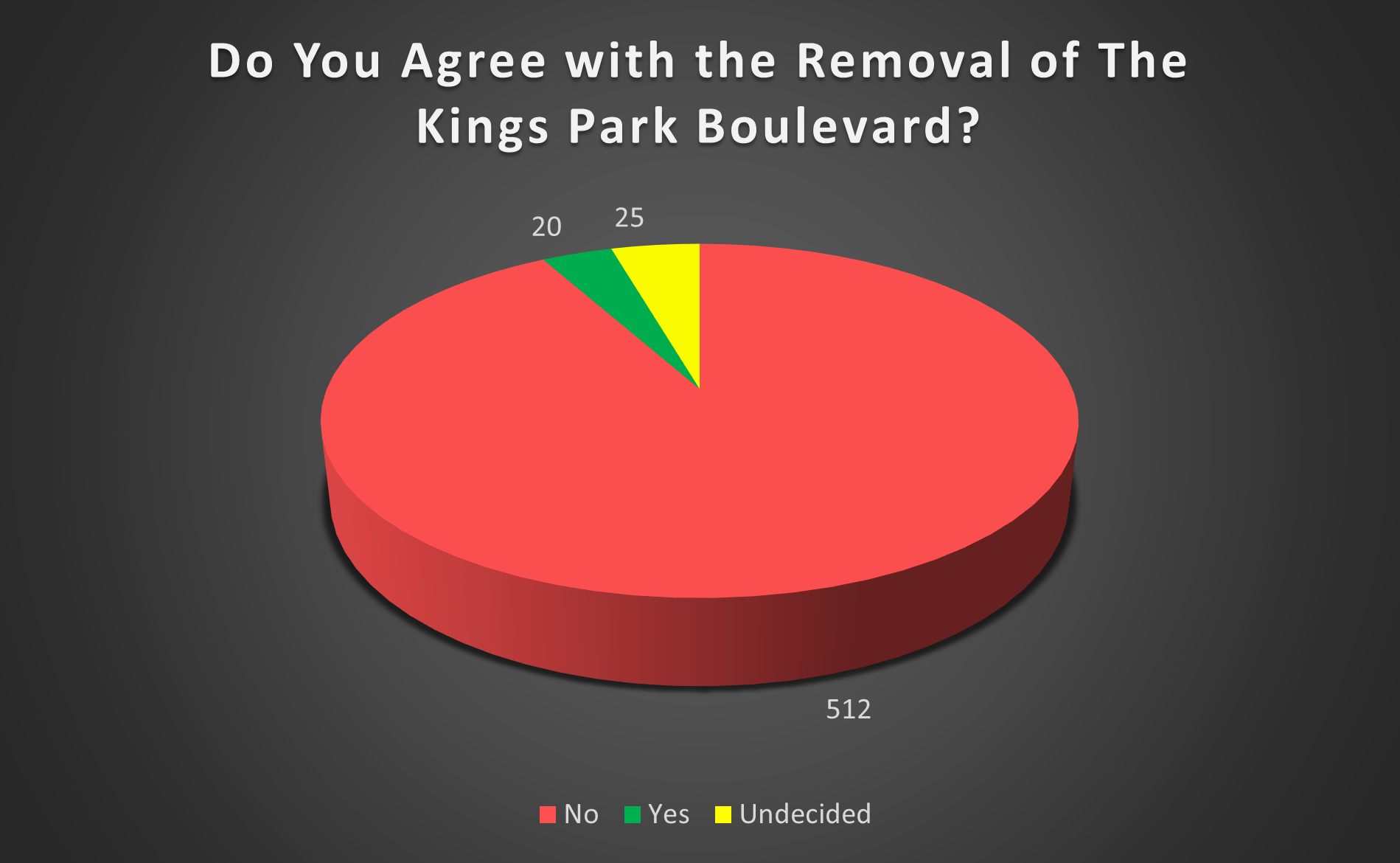
In the summer of 2023, Preserve KPPC polled community members to assess whether they were aware of the proposed removal of Kings Park Boulevard and whether they were in favor, against, or undecided about the prospect. The results were assembled into a letter and submitted to personnel in the New York State Office of Parks, Recreation and Historic Preservation. Click HERE to read the letter.
Preservation may also be accomplished through the adaptive reuse of one or more of the remaining hospital buildings. Community sentiment has responded favorably to the development of a walking museum on site as indicated by the results of Preserve KPPC’s Museum Development Survey conducted between November 2021 and March 2022.
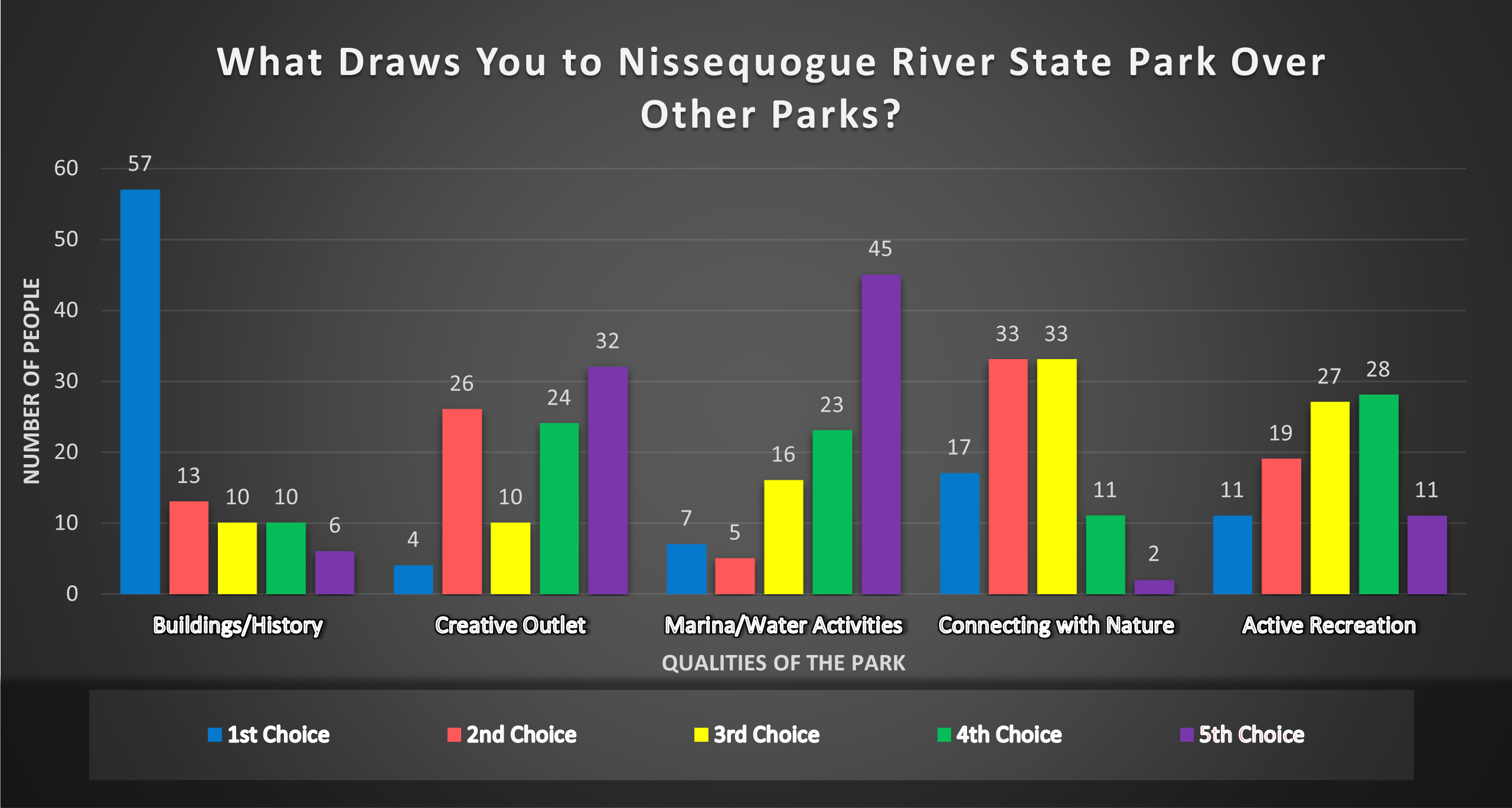
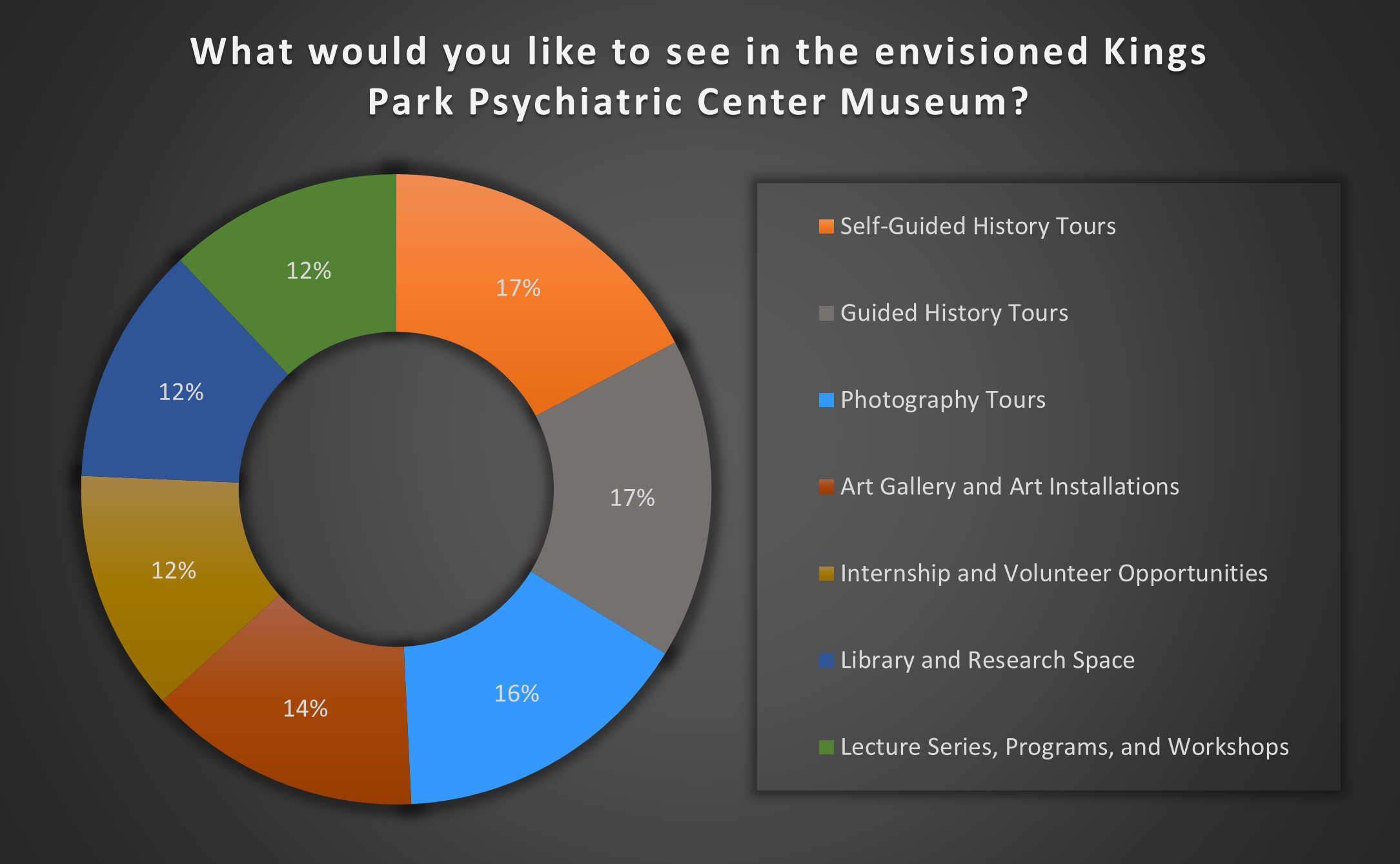
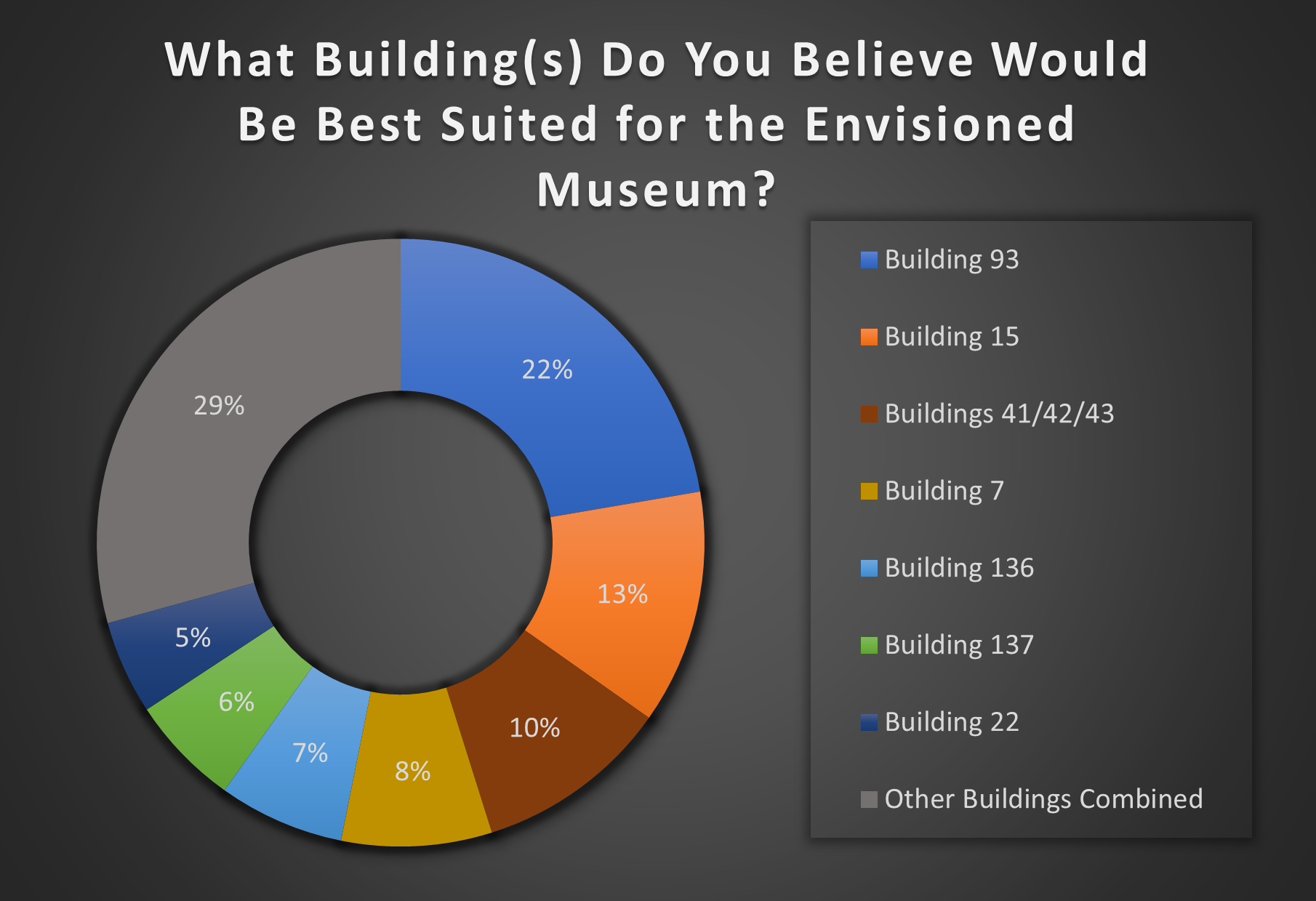
Survey by Preserve KPPC. Graph Credit Jaime Grabow.
Preservation in Practice:
The opportunity to establish a walking museum on the grounds of the former Kings Park Psychiatric Center presents an opportunity to begin and enhance conversations about mental health. Doubling as a Mental Health Education Center, the proposed walking museum will fulfill a wider purpose by speaking to a broader audience. This will help to foster a greater understanding regarding mental health, and the history of its services. Moreover, directly incorporating contemporary conversations revolving around mental health within the preservation of the Kings Park Psychiatric Center will lend itself to weakening the stigma surrounding its open expression. This may be accomplished through a person-centered approach. Please click HERE to see the presentation by KPPC.
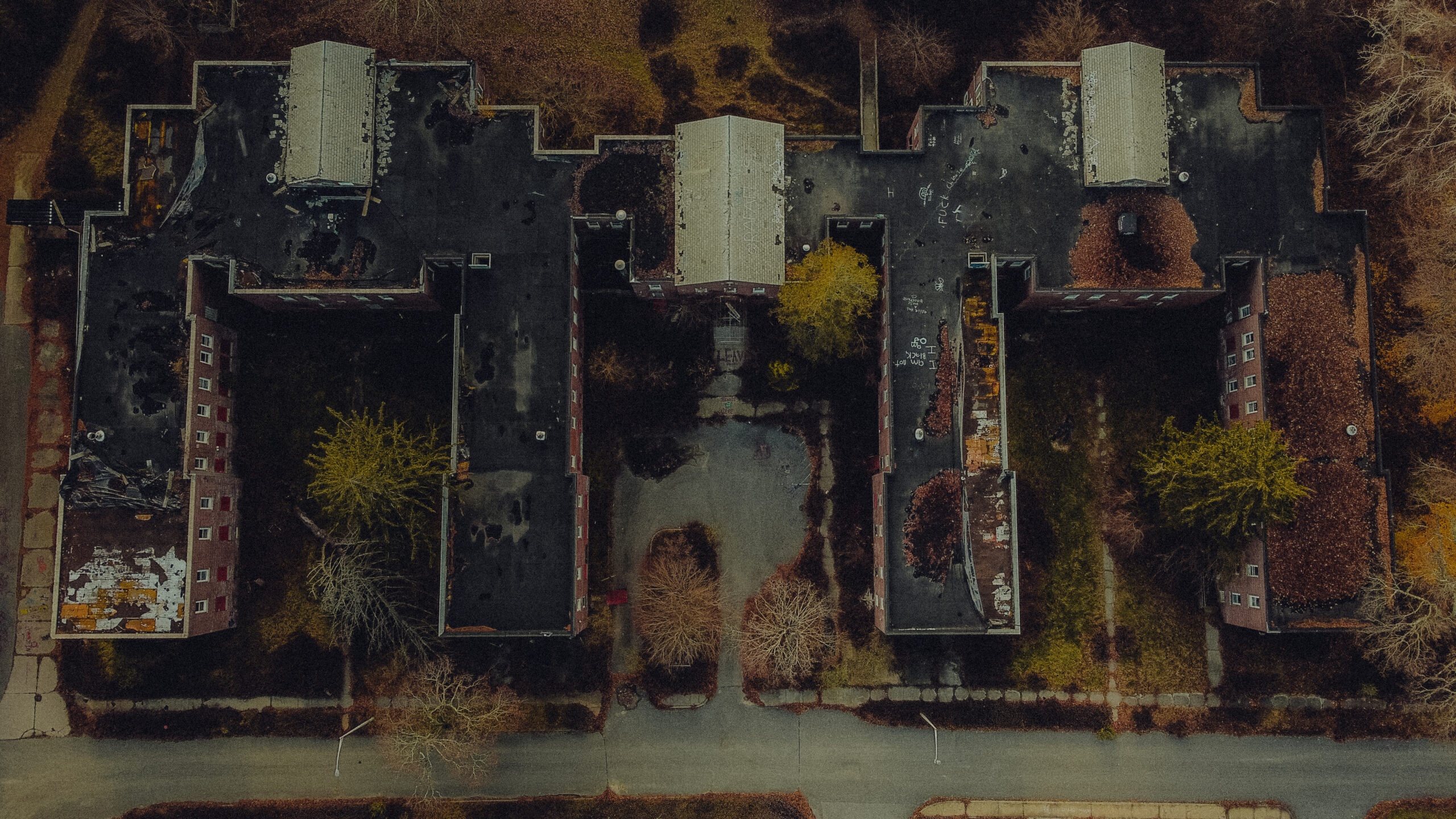
Person-Centered Language:
The typical language utilized in conversation to describe people living with mental health difficulties can create many stigmatizing attitudes surrounding the condition. However, utilizing a type of language framing known as “person-centered language,” may help decrease stigmatizing attitudes toward mental illness. Person-centered language focuses all attention on the humanistic qualities that promote mental wellness, instead of using terms such as “schizophrenic,” “bipolar,” and “alcoholic” which are spoken in popular culture and emphasize symptoms and pathologies. In other words, person-centered language separates the person from their illness and refers to the individual before their condition (e.g. using the phrase “people living with mental health difficulties” instead of “the mentally ill”).
Person-centered language is not only used to refer to an individual’s diagnosis, but also used to discuss situations involving their experiences or treatment. For example, the person-centered alternative to the phrases “becoming symptomatic” and “being reliant on medication” would be “experiencing symptoms” and “using medication as a recovery tool.” Using person-centered language, as opposed to the current language used in everyday popular culture and clinical settings, has been found to decrease stigmatizing attitudes and perceptions towards people living with psychiatric conditions.
Click HERE to listen to a Podcast Episode about Person-Centered Language
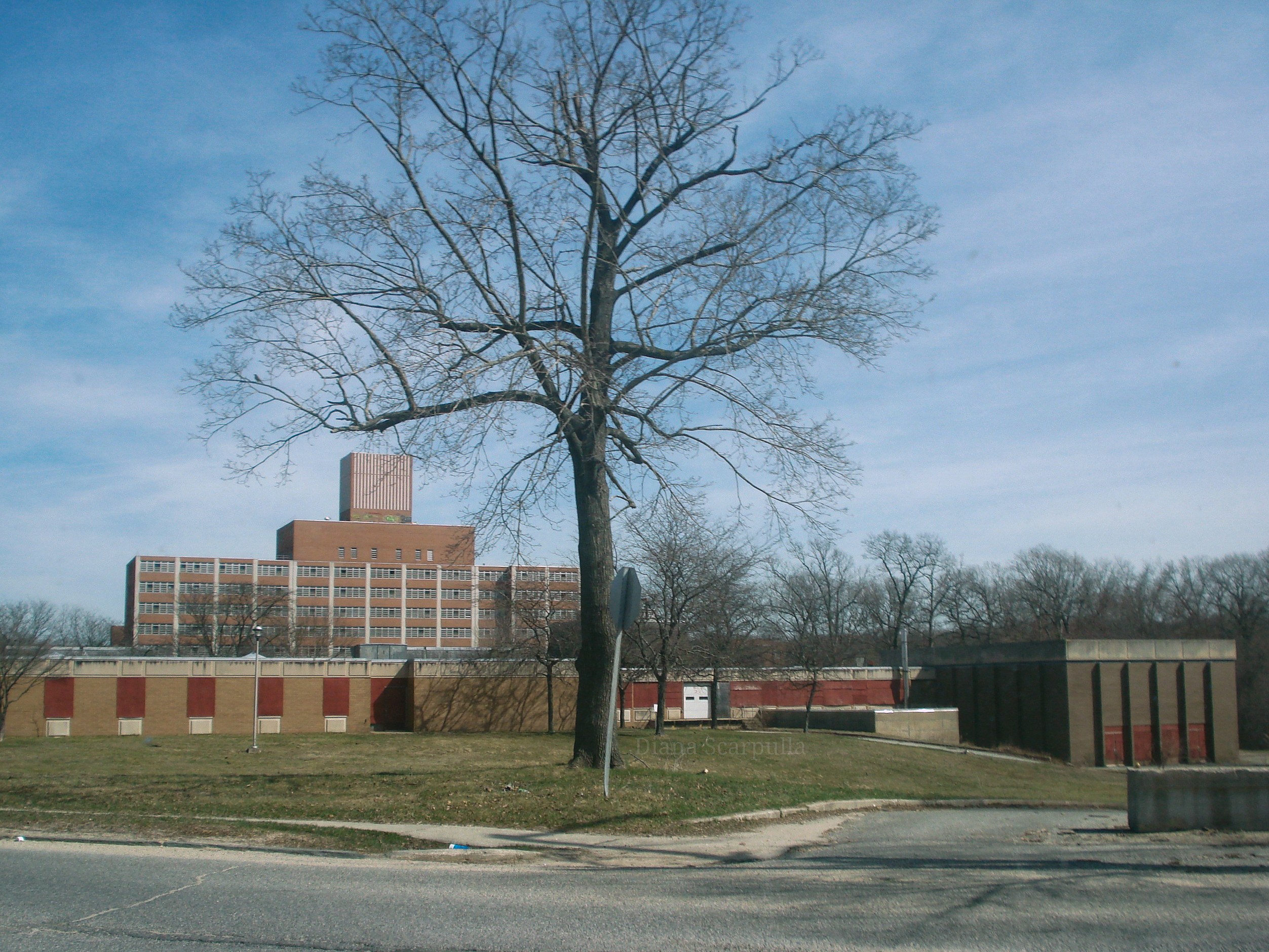
Buildings 7 & 23 Circa 2007. Photo Credit: Diana Scarpulla
Keeping the lives of the individuals who had direct contact with the Kings Park Psychiatric Center at the forefront of preservation warrants discussion regarding the maintenance of the former hospital cemetery. The restoration of the hospital’s cemetery through the installation of new fencing, benches for visitors, inclusion of appropriate signage, and regular upkeep of the grounds is long overdue. These efforts will help to restore dignity to the individuals laid to rest within. It is also, at present, undetermined whether or not the current fencing encompasses the entirety of the cemetery. Appropriate steps must be undertaken to assess the extant nature of the hospital cemetery, which can be accomplished through non-invasive practices. Moreover, the launch of a Cemetery Restoration Project will place the Kings Park Psychiatric Center into dialogue with similar restoration efforts undertaken at other state hospitals and institutions.
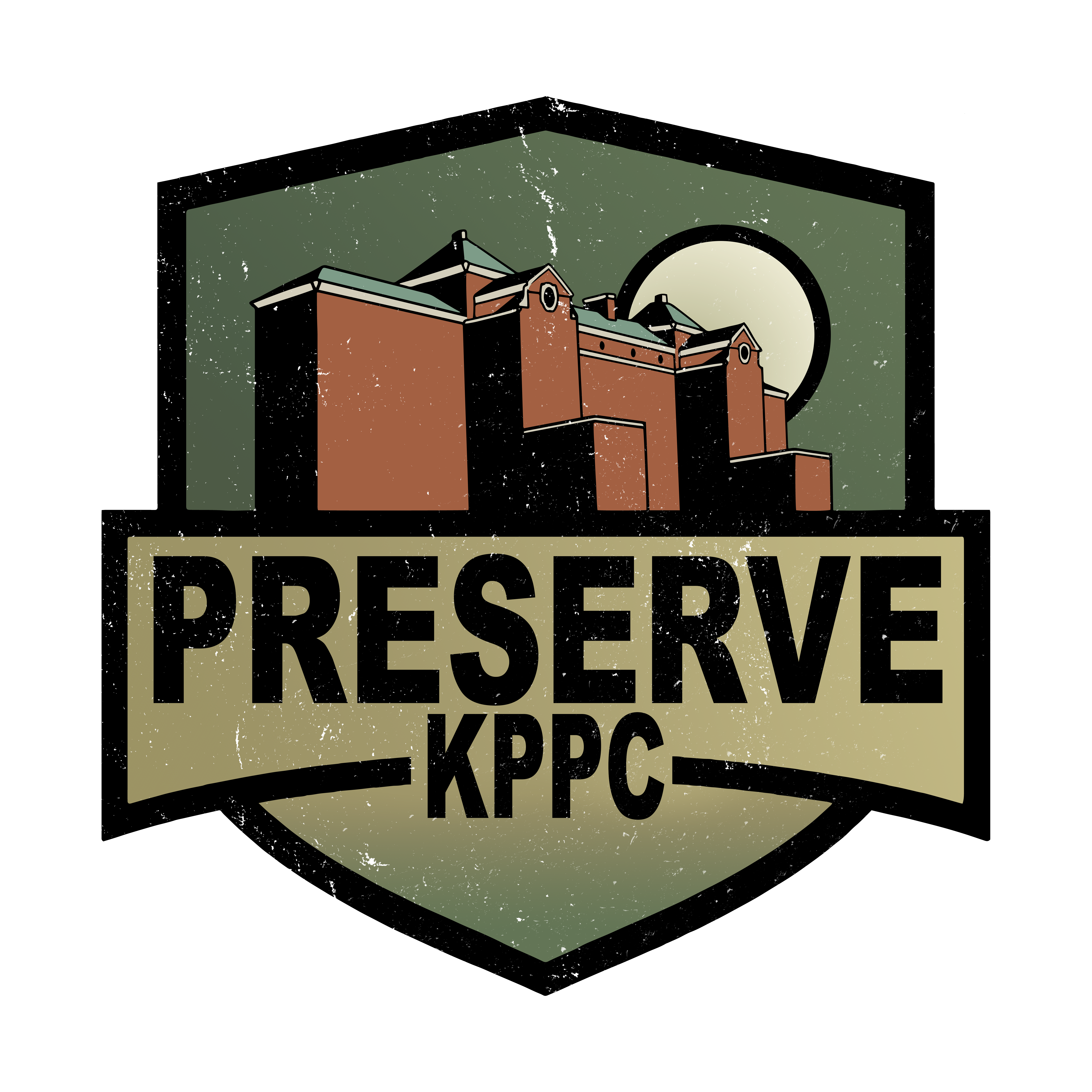
How to Get Involved:
Follow Preserve KPPC on social media to stay up to date with current news and events:
Facebook and Instagram
View Preserve KPPC Mission Statement Reel:
MISSION_STATEMENT_REEL
Watch video overview of the entire KPPC campus
Visit Preserve KPPC’s Linktree and review project proposals and other documents
Listen to our podcast streaming on various platforms
Read the Master Plan and Direct Environmental Impact Statement for the Nissequogue
River State Park.
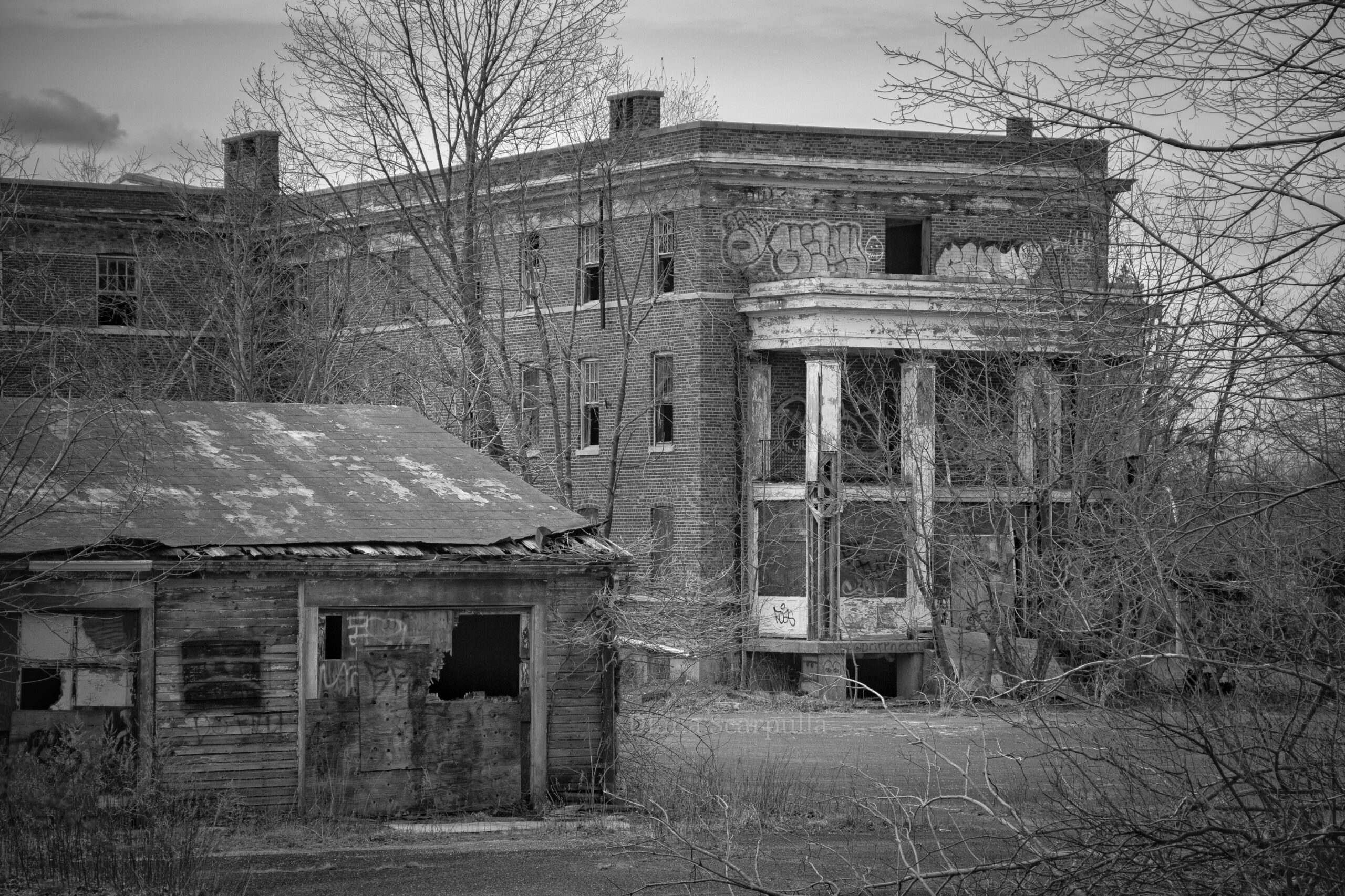
Contact your local- and state officials to voice your support for the preservation of the historical and cultural resources of the Nissequogue River State Park, site of the former Kings Park Psychiatric Center.
Contact Governor Hochul:
Send a message to the Governor online HERE, or call her office at (518) 474-8390
Or by mail:
The Honorable Kathy Hochul
Governor of New York State
NYS State Capitol Building
Albany, NY 12224
Contact your NYS Senator:
https://www.nysenate.gov/find-my-senator
Contact your NYS Assembly Representative:
https://www.nysenate.gov/find-my-senator
Contact your State Parks officials:
Erik Kulleseid, Commissioner
New York State Office of Parks, Recreation and Historic Preservation
Phone: (518) 474-0443
Email: [email protected]
George “Chip” Gorman Jr., Long Island Parks Regional Director
New York State Office of Parks, Recreation and Historic Preservation
625 Belmont Avenue
West Babylon, NY 11704
Phone: (631) 321-3501
Email: [email protected]




